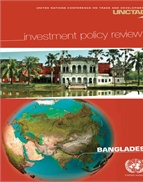Bangladesh
Bangladesh has advanced considerably on its path towards development in recent years and is expected to graduate from least developed country (LDC) status within a decade. The country offers promising prospects for investors and is likely to become one of Asia's preferred low-cost manufacturing centres given its fast-growing economy, abundant labour force and strategic geographic location.
However, the country has attracted relatively little FDI thus far and underperforms in comparison to peer countries. To date, FDI has had some limited impact in industries like mobile telephony,
power generation and financial services. Poor infrastructure is often cited as a major obstacle to FDI but the IPR of Bangladesh finds that regulatory issues are also important. To address the country's challenges, the IPR recommends actions under two pillars:
1. Enabling investment for sustainable development through an improved regulatory framework
2. Enhancing infrastructure for sustainable development through FDI
While the general investment law is
rather open to FDI, its scope and coverage are too limited and leaves plenty of room for FDI entry policy to be regulated at the sector level, where it can be treated in a much more restrictive manner.
The analysis of the IPR calls for the adoption of a modern investment law, along with other regulatory reforms to address issues affecting the wider business environment including in: foreign exchange regulations, corporate taxation, access to land, access to skills and public administration.
Download Investment Policy Review















